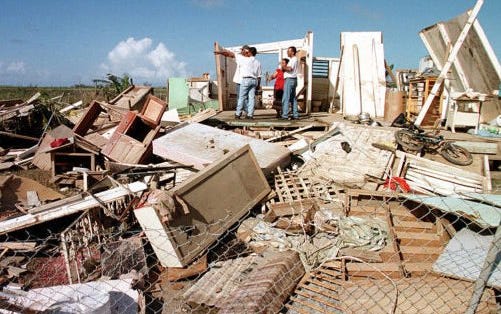Betting on Climate Failure
Pipeline developers and the financiers who back them really don’t want you thinking about the climate emergency.
It boggles the mind that project developers are planning more than 24,000 kilometres of new oil pipelines, more than a year after the staid, conservative International Energy Agency (IEA) warned that no new oil, gas, or coal projects can be built if we want to avert full-scale climate calamity.
And yet. According to Crude Awakening, a report released last week by San Francisco-based Global Energy Monitor (GEM), the oil industry is rolling this year’s record profits into enough new pipeline capacity to reach nearly two-thirds of the way around the planet. The United States and India are the two biggest builders, followed by China, Russia, Tanzania, and Canada.
“Some of the world’s biggest consumers of fossil fuels are doubling down on oil, even as the climate crisis intensifies,” said GEM researcher and report author Baird Langenbrunner. “For governments endorsing these new pipelines, the report shows an almost deliberate failure to meet climate goals.”
And Canada is doing its part to make a dire situation worse, Julia Levin, national climate policy manager at Environmental Defence Canada, told The Energy Mix ahead of the report’s release. She said the Trans Mountain pipeline expansion in British Columbia—a project whose “out-of-control” budget has hit C$21.4 billion, is on track to lose money, but is still receiving lavish support from a federal government that bought it with taxpayers’ money—will enable more than 90 million tonnes of carbon pollution per year.
Around the world, the Guardian writes, about 40% of the pipelines on the GEM list are under construction, with the rest still in planning. Their developers are betting the world won’t get serious about meeting its climate targets—because if that happens, they stand to lose a combined US$75 billion as their projects become irrelevant.
But the big names in Canada’s finance community seem to have missed the memo. Last week, we saw the Royal Bank of Canada insisting the country can’t hit its climate goals without fossil fuels, while the CEO of the Alberta Investment Management Corporation (AIMCo)—the pension fund for 375,000 public sector employees—maintained fossil fuel reinvestment is the best way to cut carbon emissions.
It’s astonishing to see GEM report that the length of new pipeline under construction around the world has more than doubled since 2019. Over that time, the IEA published its blockbuster Net Zero by 2050 report. The Intergovernmental Panel on Climate Change released a series of three alarming climate assessments, warning that we’re only about a dozen years away from blowing through the remaining carbon budget to hold average global warming to 1.5°C. We’ve seen one-third of Pakistan under water, the killer heat dome and floods in British Columbia, the devastation of this week’s Hurricanes, Fiona and Ian, and so much more.
“New pipelines are just fundamentally incompatible with what we need to do to tackle the climate crisis,” Levin told The Mix, and yet “we continue to drive in the opposite direction.”
It’s important, necessary, and incredibly hopeful to see so much work going on in energy efficiency, renewable energy, and energy storage. But just doing good things won’t deliver the carbon cuts we need, at the pace we need them. We have to “cut with both arms of the scissors” and begin phasing down fossil fuel production, not driving it up. And to get that done, the financial community has to step up now.
Mitchell Beer traces his background in renewable energy and energy efficiency back to 1977, in climate change to 1997. Now he scans 1,200 news headlines a week to pull together The Energy Mix and The Energy Mix Weekender.
You can also bookmark our website for the latest news throughout the week.
Tweet of the Week


Here’s what caught our readers’ attention this week.
Record Methane Leak from Nord Stream Pipelines is ‘Catastrophic for Climate’
One Dead, Atlantic Without Power as Hurricane Fiona Slams Region
Canada Adds to Alarming Rise in Global Pipeline Construction
Canadian Senators Launch Climate Solutions Group
Real Climate Targets May Push Big Banks Out of Net-Zero Alliance
Africa’s Climate Finance Gap Hits $108B Per Year as COP 27 Nears
Texas Export Terminal Admits Human Error in LNG Explosion, Fire
Nova Scotia Power Seeks Cape Breton Coal Despite Green Transition
IN CASE YOU MISSED IT: An exclusive look at some of the top stories we’re following.
Putin's War Prompts Coal-Friendly Poland to Embrace Heat Pumps (Washington Post)
Campaigners Launch First Lawsuit Against Russian Emissions (The Guardian)
High Heat Collapses Patagonia Glacier (Reuters)
Heat Stress Drives Up Food Supply Concerns (Yale Climate Connections)
Battery Breakthrough Could Lead to Instant Charging (The Independent)
Quebec Lithium Mine Shows Risks in EV Supply Chains (New York Times)
Decarbonizing the U.S. Grid: The Last 10% Will Be the Toughest (Inside Climate News)
China's 'Rust Belt' Plans $87B for Clean Energy Overhaul (Bloomberg)
European Central Bank to Apply Climate Scores to Bond Buys (AP)
Community Banks Help Small Businesses Invest in Clean Energy (GreenBiz)
U.S. Becomes 137th Country to Ratify Phaseout for Climate Super-Pollutant (Washington Post)
Air Canada Buys 30 Electric-Hybrid Aircraft (MTL Blog)
Video of the Week
Will Grant presents the Four Levels of Climate Action. Video: Pachamama Alliance. For more on Project Drawdown, click here.
Climate Solutions = Climate Action
We all want to be part of the solution to climate change. Here’s where you can start.








I’m reading a book now - ‘Bypassing Dystopia’ - by Joyce Nelson (who unfortunately died last winter). I recommend this book. It describes how ‘we, the people’ unintentionally, and unknowingly, gave away our option to have the Bank of Canada finance public projects with money it created. We could regain that power. I would lend you this book.